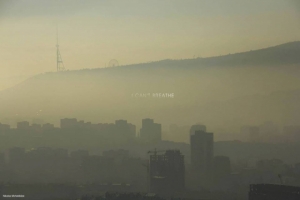Returning Lost Air
TBILISI – Air pollution is one of the most important issues in Georgian society. Spreading blood disease and other chronic disease is one of the main issues in children as well as adults.
A draft law with several articles was introduced to parliament by the Ministry of Environment and Nature protection to discuss gasoline and diesel fuel regulation last week.
The draft law considers automobile quality control standards for gasoline and diesel fuel, defined by the resolution from the government of Georgia and automobile gasoline and diesel fuel import, production or delivering on Georgian territory. The fine for breaking these conditions is 10 000 GEL.
Significant penalties will be imposed on the delivery or production of gasoline or diesel fuel that does not meet with the quality norms defined by the Georgian Government.
Parliament approved the bill by two hearings and soon a third will take place. By receiving the draft law the government hopes that the quality of fuel will be controlled in the country and it will hinder the deterioration of air quality. However the reality requires a different type of concrete step as air quality in Georgia has deteriorated yearly.
According to the National Center for Disease Control and Public Health respiratory diseases are spreading in adolescents and children in particular. The number of people with leukaemia is increasing yearly. According to an official statistic the import of oil products in 2015 amounted to 1036.1 tons, exceeding the 2014 total by 132.6 tons, a 12.8% increase.
Oil product importer Union declared that in 2015 the import of petrol amounted to 441 tons, which exceeded the previous year’s figure by 67.2 tons. Diesel imports amounted to 595.1 tons which is 65.5 tons more than the previous year.
Experts stated that both “Euro 1” and “Euro 2” fuel is still for sale in Georgia, while most neighbouring countries have already moved to “Euro 4” and Euro 5” fuel.
Quality control for the fuel is entrusted to fuel importers and there is no real mechanism for inspection currently. For instance it is unknown to society that after introducing a new legislation about which institution is controlling the amount of Benzene in fuel, the total amount should be 1% according to Georgian legislation in 2016.
But what is the content of Benzene in Imported fuel in Georgia. According to Inga Grdzelishvili, known as the Georgian infectionist, an Environmentalist and Ecotoxicology living in the US, admits that Benzene is in the first group of toxic substances that is extremely dangerous to human health.
The chronic influence of Benzene causes leukaemia and “Aplastic” anaemia, the lasting effects of Benzene increase the risk of the disease. Benzene damages the liver, kidneys, hearing and the brain. Benzene is added to fuel to increase the Octane number.
In the 1970’s when adding Ethyl lead (tetraethyls lead) to fuel was restricted Benzene appeared as an alternative. It functioned more or less the same way but lessened the “knocking” effect. Since then its vast utilization began but was reduced when it was discovered that it was a mutagenic substance.
There are frequent cases of leukaemia in big cities in Georgia and 50 new cases are observed annually. The cases are particularly high in cities where there are a large number of vehicles. According to experts the large amount of Benzene in fuel is one of the biggest causes of leukaemia.
The main source of air pollution in Georgia is from car emissions. Out of the total emissions around 71% is thought to come from vehicles. Experts believe that in cities this percentage could be around 80% however. Polluting substances emitted from transport pose a real threat to public health and it is directly linked to the growing number of health problems. This is thought to be mainly caused by older vehicles.
The main problem is the quality control of fuel. Together with defective cars the fuel quality from transport are the main reason for the increase in health issues. The emissions contain: Carbon monoxide, carbon dioxide, hydrocarbons, soot particles, ethyl lead, sulfur dioxide, nitrogen dioxide.
The main challenge for Georgia is to create a proper system of quality control as neither the government nor society knows the situation truly for the air quality in Georgian cities and other populated areas. However citizens are interested in information about the origins and causes of specific pollutants and their relation to the state of health in the country.
During the last 20 years the argument made by the Georgian government was that machinery for air control was too expensive. However the development of new technology has created innovative technology which is available cheaply and is effective in controlling air pollution.
In August 2015 UNI piloted its technology which consisted of several air measurement machine (priced at $1500) the installation of 20 will provide the opportunity to monitor air quality for 24 hours.
In recent years various organizations have implemented disposable air quality measurement indicators, which do not show the whole picture.
In order to decrease the level of air pollution a system of monitoring for fuel quality must be put in place.
It is also important that the State, after it adopts a new law, introduces a petrol labelling system and demands that they inform the consumer about the content of the fuel in order to allow the consumer to make an informed decision.
The amendments presented to the Ministry of Environment and Natural Resources to approve in the Georgian parliament must not just remain on paper, they must clearly define the mechanism by which the State Institute will carry out its implementation.
Author: Gela Kvashilava
Gela Kvashilava is the founder the Partnership for Road Safety fund (http://safedrive.ge), advisory council member and regional consultant of the British organization Eastern Alliance for Safe and Sustainable Transport (www.easst.co.uk), expert at the EU TRACECA road safety project.












